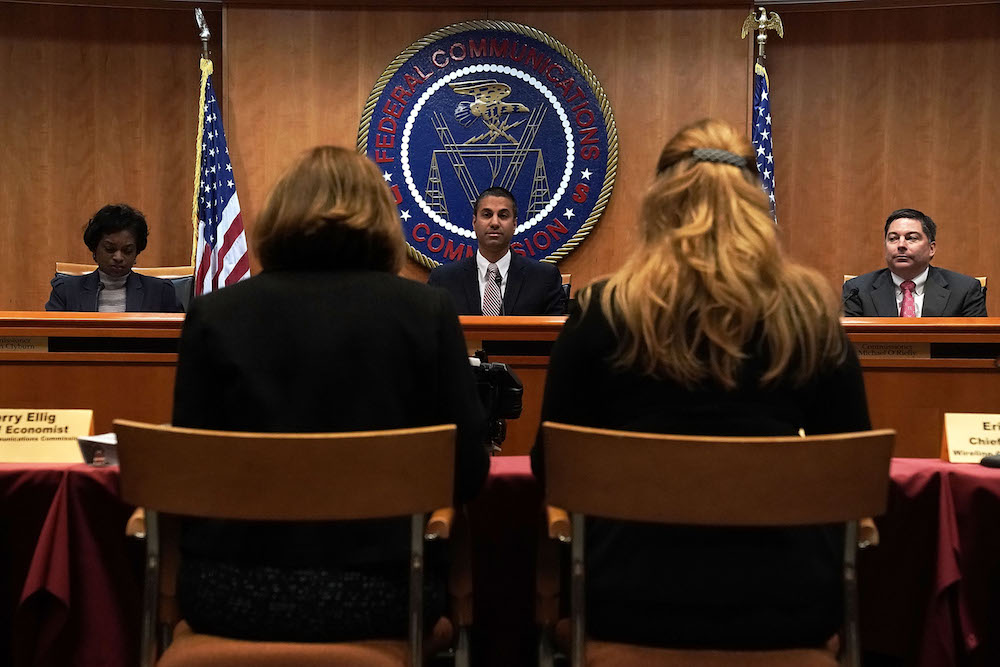In what was a widely expected move, the Federal Communications Commission voted 3-2 Thursday to end net neutrality. Chairman Ajit Pai was joined by his two Republican colleagues in voting in favor of the change, Democrat commissioners Mignon Clyburn and Jessica Rosenworcel dissented.
The decision reverses landmark rules put in place by the FCC in 2015 that reclassified broadband access as a telecommunications service. Internet service providers were ruled common carriers under Title II of the Communications Act of 1934—basically ensuring that high-speed internet would be regulated as a public utility, like phone services. Since President Trump appointed Pai as FCC chairman, he has argued that the Obama-era ruling amounted to “micromanaging the internet,” impeding investment in the industry and restricting consumer choices.
Before Thursday’s ruling, internet providers like Comcast or Time Warner were required to treat all information on the internet the same. They couldn’t charge more for specific types of content, for example, block certain websites simply because they were tied to a competitor, or slow down traffic to sites that take up a lot of bandwidth, like streaming video services. A consumer’s internet bill paid for just that—the internet—and covered anything that you might access via the internet, whether email, music, or games. With the end of net neutrality, Comcast, which owns NBC, could charge consumers more to access non-NBC content. It could throttle traffic to Netflix, or sell it as an entirely separate package consumers would have to pay extra for.
That’s what Pai (who once served as general counsel at Verizon, by the way) means when he talks about consumer choice—splitting up the internet into different tiers the way cable companies package channels. Instead of paying $39.99 a month for total access to the internet, for example, you might pay $7.99 for email, $19.99 to access music providers like Spotify, another $19.99 for video sites like YouTube or Hulu, and $25.99 for gaming. In the end, consumers could be paying more for less.
For creators—whether artists on sites like Bandcamp who rely on open access to their content to attract new fans, or tech startups, who will be competing with established giants that may have contracts and deals with ISPs—it will likely mean fewer opportunities to innovate and reach consumers in the market. That’s not only bad for individuals, but the economy as a whole, which relies on new products and platforms to stay healthy and competitive.
It’s unlikely users will notice much of a difference in the internet in the immediate future. Changes to service will likely initially be small to avoid a public outcry, and when they do go in place, providers will have to give consumers proper notification (which is pretty much the only thing required of ISPs under the new rules).
There will also undoubtedly be numerous court challenges to the FCC’s ruling. Already, the National Hispanic Media Coalition has announced its intention to file a suit against the commission, calling the changes “a frontal attack on Latinos and other communities of color who already face substantial barriers in getting online, staying online, and having high quality Internet.” New York State Attorney General Eric Schneiderman also tweeted that he intends to sue. And they may have a strong case—as noted by The Verge, any alterations to FCC regulations cannot be made for “arbitrary and capricious” reasons, meaning lawyers for the commission will have to argue that something significant changed in the industry between 2015 and 2017 to necessitate the new rules.
Fortunately for the FCC, President Trump has already appointed 19 judges who may be sympathetic to the commission’s arguments. It was a federal appellate court that saved net neutrality in 2015, will it be another that drives the final nail in its coffin?





